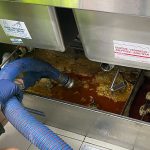The Role of Vacuum Excavation Services in Complex Urban & Rural Environments
Whether in the heart of a city or the quiet of the countryside, excavation projects demand a level of precision and care that traditional methods often struggle to meet. From avoiding damage to underground utilities in urban zones to preserving sensitive ecosystems or cultural assets in rural areas, the demands of vacuum excavation services such as digging are high and the risks significant.
Vacuum excavation is an effective solution for such challenging conditions, offering safer, cleaner, and more controlled processes. For companies like Clarence Valley Septics, this method presents a reliable approach to undertaking complex projects while maintaining a strong commitment to environmental stewardship and infrastructure protection.
Precision Digging in Urban Areas
Urban environments present a unique set of excavation challenges. Narrow laneways, heavy foot traffic, complex utility networks, and restricted access can make conventional excavation difficult and dangerous. Precision digging is essential in these scenarios, and this is where vacuum excavation services come in.
By using high-powered suction to remove soil while simultaneously cutting with air or water, vacuum excavation allows operators to expose buried infrastructure with remarkable accuracy. This significantly reduces the risk of damage to utilities such as gas lines, fibre optics, and water mains. In city centres, where utility strikes can cause massive disruptions and financial loss, this level of control is invaluable.
Vacuum excavation services also help minimise the impact on nearby businesses and residents. Traditional digging methods can create excessive noise, dust, and debris, often leading to complaints and project delays. In contrast, the cleaner, quieter nature of vacuum excavation makes it more suitable for daytime work in populated areas, ensuring that projects stay on schedule with minimal public disruption.
Heritage Site Protection in Rural Settings
Rural projects can take place in locations that demand sensitivity, such as near Indigenous heritage sites, historic ruins, or ecologically sensitive land. Here, the importance of site protection cannot be overstated. Damaging these areas, even inadvertently, can lead to legal consequences, community backlash, and irreversible loss of cultural or natural value.
Vacuum excavation services provide a non-invasive method to explore and work around such delicate areas. Unlike mechanical excavation that might excessively disturb soil layers, vacuum excavation offers a far more controlled process, reducing the likelihood of damage or disrupting significant formations.
Working in rural environments with cultural or historical significance requires the utmost diligence, and vacuum excavation ensures that necessary work, such as septic system installation or maintenance, can proceed without endangering the local environment.
Navigating Confined Spaces
One of the notable features of vacuum excavation services is their ability to operate efficiently in confined or restricted spaces. Urban streetscapes, alleyways, and narrow easements often leave little room for machinery or manual digging. The flexibility of vacuum excavation units allows them to reach into tight areas without requiring significant setup space.
In rural settings, confined spaces can include densely vegetated areas, sloped terrain, or locations near creeks and waterways. Accessing these areas with traditional equipment can result in damage to the surrounding environment. Vacuum excavation, with its small physical footprint, ensures minimal disturbance to vegetation and soil, making it a suitable solution for work in delicate or hard-to-reach areas.
Vacuum excavation services also enhance safety for workers in confined areas by reducing the need for manual trenching or exposure to unstable soil. This not only improves project timelines but also aligns with safety requirements.
Reducing Environmental Impact
Environmental protection is important in both urban development and rural land management. As awareness grows around the effects of construction on the environment, there is a shift towards technologies that lower impact and support sustainable practices. Vacuum excavation services are gaining popularity because of their minimal disruption to the surrounding area.
Traditional excavation can lead to soil erosion, water pollution, and destruction of native plant life. Vacuum excavation, by contrast, moves only the necessary amount of material and allows for precise control of any debris and runoff. This is particularly important in rural regions where groundwater contamination or erosion could have consequences.
In urban environments, where stormwater drains and green spaces are integrated into city planning, vacuum excavation is being used to maintain infrastructure with minimal risk of disturbing ecosystems. Whether it’s cleaning stormwater infrastructure or exposing underground drainage, the minimal footprint of vacuum excavation services supports urban planning and development.
Adapting to Urban and Rural Excavation Challenges
As infrastructure demands grow in urban and rural Australia, the tools and techniques used to meet them must evolve accordingly. Vacuum excavation services provide an intelligent, reliable alternative to conventional digging, offering precise results with minimal disruption. Whether it’s preserving heritage sites, navigating city streets, or reducing environmental impact, this technology meets the challenge.
Contact Us Today
Clarence Valley Septics offers professional vacuum excavation services tailored to meet the demands of complex environments. If you’re planning a project, contact us today on 6645 3100 or via our website to learn how our expertise can support your goals with safety, precision, and care.


